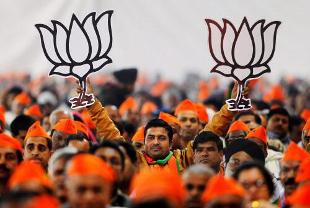Mumbai/Pune, Sep 15; Tension brewing within the Shiv Sena-BJP alliance over seat-sharing for upcoming Maharashtra assembly polls escalated today with BJP disapproving Sena chief Uddhav Thackeray's statement that in the event of a saffron victory, the top post would go to his party and that he was not averse to assuming it.
 BJP, an all-weather ally of Shiv Sena, is rankled by Uddhav's public statement yesterday that the chief minister of Maharashtra will be from Shiv Sena only if the saffron alliance is voted to power after October 15 elections.
BJP, an all-weather ally of Shiv Sena, is rankled by Uddhav's public statement yesterday that the chief minister of Maharashtra will be from Shiv Sena only if the saffron alliance is voted to power after October 15 elections.
"It is for the people to decide if they trust me. They will decide whom they want as the face (chief minister). I am not hankering after any post but will not shy away from responsibility either..But the face will be from Shiv Sena only," Uddhav had said.
Adding to unease in BJP, Sena had rubbed in with an editorial in its mouthpiece 'Saamana' using a risque metaphor to attack BJP, which has become more assertive over number of seats to contest in Assembly elections after its massive victory in Lok Sabha polls.
"Excessive lust leads to divorce. Allies in the coalition must dream of a victory. For this, all parties must give up the lust for more seats. To say we will stay in the coalition only if we get 'so many seats' is not right," 'Saamana' had said.
Reiterating Uddhav's statement, the party MP Sanjay Raut today said the next chief minister will be from Shiv Sena only.
"In two to three days, it will be clear to everyone that the Shiv Sena and BJP alliance, that has been going strong from the last many years is going to be strong this time as well..Who will be the CM of the state will be decided by Shiv Sena. The next CM will be from the Shiv Sena only," Raut said in Mumbai.
Miffed with Sena's aggressive stand on the issue, BJP today launched a counter attack saying that in the event of a victory in the Assembly elections, the next government will be led by BJP.
"Sanjay Raut is not a top leader of Sena. Talks are going on between the top leadership of the two parties. However, they (talks) have now hit a speed breaker," party spokesperson Madhav Bhandari said.
"The next government in Maharashtra will be formed under the leadership of the BJP. Our national president (Amit Shah) had made this very clear while on his trip to Mumbai. And his decision is final," Bhandari added.
Disapproving Uddhav's statement which is prominently published in 'Saamna', BJP leader and in-charge of Maharashtra affairs, Rajiv Pratap Rudy said, "It is desirable to refrain from making such statements prior to elections and talks."
"This issue (of who gets to decide the CM) will be decided after the elections. The BJP expects a mature and respectable understanding from the Sena," Rudy told reporters in Pune.
"BJP had proposed that after allotting respective share of seats to smaller alliance partners, including RPI (Athavale) and Swabhiman Party led by Raju Shetti, the remaining seats should be divided equally between BJP and Shiv Sena," he said.
Rudy said that in this background, BJP is expecting to contest about 135 seats, leaving the same number to Shiv Sena.
In the 288-member House, Shiv Sena and BJP had contested 169 and 119 seats respectively in the 2009 Assembly elections.
In just-held Lok Sabha elections, BJP won 23 seats out of total 48 seats in Maharashtra while Sena bagged 18 seats.
The time-tested formula in the saffron alliance in the state is 169 seats for the Sena and 119 for the BJP in Assembly elections.
The state BJP reportedly wants at least 15 seats more from the Sena citing its performance in Lok Sabha elections, however Sena is apparently sticking to the old formula.





Comments
Add new comment